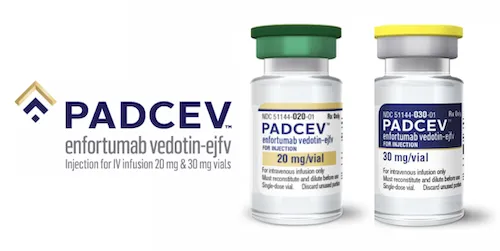Seagen Canada Announces Availability of PADCEV to Treat Advanced Bladder Cancer

Seagen Canada announced the commercial availability of PADCEV® (enfortumab vedotin) for the treatment of adult patients with unresectable locally advanced or metastatic urothelial cancer (mUC) who have previously received a platinum-containing chemotherapy and programmed cell death receptor-1 (PD-1) or programmed death ligand (PD-L1) inhibitor therapy.
Bladder cancer affects an estimated 12,000 Canadians each year making it the fifth leading cancer diagnosis in Canada. Bladder cancer is a disease where cancer cells form in the tissues of the bladder. Urothelial cancer is the most common type of bladder cancer, accounting for about 90 per cent of all cases. The advanced stages of urothelial cancer are often referred to as locally advanced or metastatic. Although some locally advanced or metastatic bladder cancers will stop growing, shrink, or even disappear in response to current treatment options, the cancer almost always returns and grows aggressively, shortening life expectancy.
"Metastatic urothelial cancer is an aggressive disease with limited treatment options and a poor prognosis," says Dr. Srikala Sridhar, MD, Head of the Genitourinary Medical Oncologists of Canada, Professor and Medical Oncologist at the Princess Margaret Cancer, in Toronto. "PADCEV is the first drug beyond chemotherapy and immunotherapy to show a significant survival benefit in metastatic urothelial cancer and as such represents an important therapeutic advance in the field."
The Heath Canada approval of PADCEV was based on an open–label, randomized, phase 3, multicenter study (EV 301) that enrolled 608 patients (including 52 Canadians) with unresectable locally advanced or metastatic urothelial cancer who received prior treatment with a platinum–containing chemotherapy and PD–1 or PD–L1 inhibitor, a type of immunotherapy. At median follow-up of approximately 11 months, compared with chemotherapy, enfortumab vedotin met its primary endpoint and improved overall survival (OS) by almost four months (median 12.88 months versus 8.97 months).
"We've seen first-hand how more treatment options can improve the quality of life for those living with metastatic or advanced bladder cancer," says Michelle Colero, Executive Director, Bladder Cancer Canada. "We are particularly pleased about the approval of enfortumab vedotin as this new treatment alternative offers patients the opportunity to make plans for their future, while dealing with their diagnosis and treatment today."
A recent Seagen Canada survey gauging Canadian's knowledge of bladder cancer, conducted by Leger Research, found that many Canadians have limited knowledge as it relates to the condition.
Key survey learnings included:
- less than one third (31%) of respondents knew smoking was a risk factor for bladder cancer;
- most respondents (89%) are unaware that bladder cancer has one of the highest recurrence rates among all cancers;
- the majority of respondents (60%) did not know that certain occupations, such as painter, plumber or firefighter, can pose a higher risk for developing bladder cancer;
- only four-in-ten (42%) respondents know that bladder cancer is a treatable cancer, relative to some other forms of cancer.
About Bladder Cancer
Caught early, a bladder cancer prognosis is excellent for most patients. Caught late, it can be a life-altering or life-ending disease. Once diagnosed, lifetime urology check-ups will be required. Risk factors for bladder cancer include smoking, over 50 years of age and occupational exposures. It also impacts men more than women. People with bladder cancer which has spread to other parts of the body (about 10-15% of patients) have a poor prognosis, with only about 5% living for five years after diagnosis.
About PADCEV
PADCEV is an antibody-drug conjugate (ADC) that is directed against Nectin-4, a protein located on the surface of cells and highly expressed in bladder cancer. Nonclinical data suggest the anticancer activity of PADCEV is due to its binding to Nectin-4 expressing cells followed by the internalization and release of the anti-tumor agent monomethyl auristatin E (MMAE) into the cell, which result in the cell not reproducing (cell cycle arrest) and in programmed cell death (apoptosis).
January 25th, 2022



